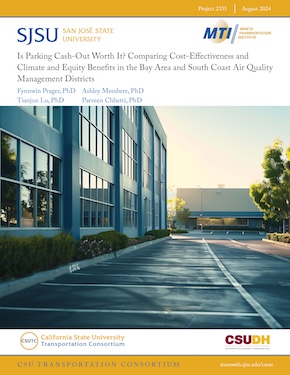- 408-924-7560
- mineta-institute@sjsu.edu
- Donate
Is Parking Cash-Out Worth It? Comparing Cost-Effectiveness and Climate and Equity Benefits in the Bay Area and South Coast Air Quality Management Districts
This research explores the potential impacts of California parking cash-out policy changes on the Bay Area and LA County. Parking cash-out—a California law since 1992—requires that certain qualifying employers who subsidize employee parking offer employees the option to give up their parking space and receive cash instead. Studies show parking cash-out substantially reduces VMT and emissions, yet enforcement remains voluntary. Current policy covers few firms (<1%) and employees (around 11%) in the study regions. Policy reform to include companies with 20+ employees could increase this to 18%. Our experimental-design survey (n=963) explores behavioral changes in response to multiple policy variables and finds that 76.9% of employees would accept cash-out if offered, and that participants who had to pay the market rate for parking and were full-time commuters were more likely to switch to using public transportation at lower cash minimums. VMT related to employees covered by parking cash-out are substantial (5.6 million in the Bay Area; 5.7 million in LA County), and account for a combined 6,593 daily tons of GHG. As even limited adoption could have significant environmental benefits, parking cash-out would be a more cost-effective approach to reducing VMT than traditional TDM programs such as trip-reduction programs, workplace parking taxation, or transit subsidies and road diets, though further evidence on the direct influence of parking cash-out on commuter behavior is needed.
FYNNWIN PRAGER, PHD
Dr. Prager is Associate Professor of Public Administration, Director of the School of Public Service and Justice, and Co-Director of the South Bay Economics Institute at CSU Dominguez Hills. He received his PhD from—and undertook a Postdoc at—the USC Price School of Public Policy. He is an External Research Fellow at USC’s Center for Risk and Economic Analysis of Threats and Emergencies. His research and publications in journals such as Risk Analysis, International Journal of Disaster Risk Reduction, Transportation Research Part A, Contemporary Economic Policy, Transport Policy, Research in Transportation Business and Management, Journal of Entrepreneurship and Policy, and The World Economy have focused on the policy and economics of disasters, particularly environmental and terrorism policy, as well as regional economies and transportation systems. Dr. Prager has published two books: Terrorism: An International Perspective with Professor Gus Martin at CSUDH and Economic Consequence Analysis of Disasters with Professor Adam Rose and colleagues at USC. Dr. Prager is committed to teaching, research, and service at CSUDH, and interconnects his classroom with research for numerous regional and national organizations, including U.S. Customs and Border Protection, U.S. National Biosurveillance Integration Center, California Air Resources Board, World Trade Center, Los Angeles, South Bay Workforce Investment Board, CSU Transportation Center, and Department of Cannabis Control.
TIANJUN LU, PHD
Dr. Lu is an Assistant Professor in the Department of Epidemiology and Environmental Health at University of Kentucky. He received his Ph.D. in Planning, Governance, and Globalization from Virginia Tech and was a Research Scientist at the University of Washington. Dr. Lu’s recent work has been published in Transportation Research Part D: Transport and Environment, Environmental Science and Technology, and Science of the Total Environment. His scholarly contribution mainly falls into multidisciplinary fields including transportation planning, air pollution exposure assessment, environmental justice, and environmental health. Dr. Lu has rich experience in developing nationwide air quality models funded by the U.S. Environmental Protection Agency (i.e., air pollution exposure models in the continental U.S.), a community-level air quality project funded by the Minneapolis Department of Health, MN, and CSUDH, and community-based transportation measurements and modeling work funded by U.S. Department of Transportation. Currently, he has served as the primary investigator for multiple funded projects in California and Texas, including the California telecommuting project to identify statewide patterns and trends of telecommuting, climate and environmental impacts of warehousing, the Community Air Monitoring Program in Southern California, and a community-based air monitoring campaign in the Gulf Region in Texas.
ASHLEY MEMBERE, PHD
Dr. Membere is an Assistant Professor in the Psychology Department at California State University Dominguez Hills. Her area of specialty is Industrial/Organizational Psychology. Dr. Membere’s research focuses on diversity, equity, and inclusion related issues in the workplace. Her program of research includes investigating the experiences of marginalized employees and developing intervention strategies to create more inclusive and equitable work environments. To address these topics, Dr. Membere employs the use of complex experimental methodologies and survey designs for both cross-sectional and longitudinal studies as well as the use of secondary data sources.
PARVEEN CHHETRI, PHD
Dr. Chhetri is an Associate Professor in the Department of Earth Science and Geography and serves as the Program Director of the MS Environmental Science at California State University Dominguez Hills. His expertise lies in Environmental Geography and Geospatial Technology, particularly in Geographic Information Systems (GIS) and Remote Sensing (RS). Dr. Chhetri teaches a range of courses, including Physical Geography, Natural Resources, GIS, and RS. Dr. Chhetri's expertise in GIS, RS, and Energy and Climate Change is reflected in his publication record of peer-reviewed articles covering these subjects. Currently, he is engaged in a research project that examines the environmental impact of telecommuting. Additionally, Dr. Chhetri is working with numerous graduate and undergraduate students on various research projects. These projects encompass the response of forest ecosystems to climate change, energy and climate change concerns specific to the LA region, GIS-based flood mapping, and the assessment of ecosystem services provided by urban trees using geospatial technology.
-
Contact Us
San José State University One Washington Square, San Jose, CA 95192 Phone: 408-924-7560 Email: mineta-institute@sjsu.edu






